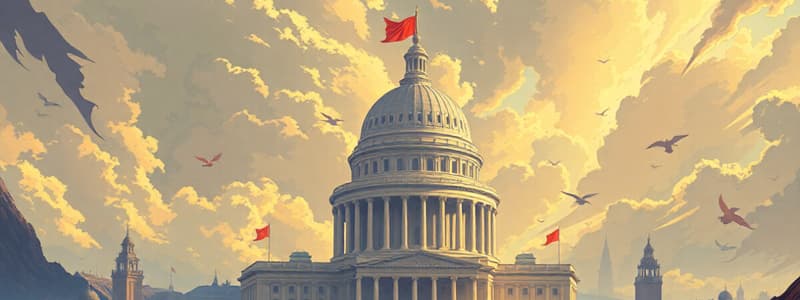Podcast
Questions and Answers
What is politics generally applied to?
What is politics generally applied to?
- Baking pastries
- Engineering bridges
- Running governmental or state affairs (correct)
- Exploring space
Which of the following is a key consideration in political science?
Which of the following is a key consideration in political science?
- The study of stars
- The formation of rocks
- The distribution and transfer of power (correct)
- The breeding of animals
What does public policy address?
What does public policy address?
- The curing of disease
- The building of homes
- The study of ancient civilizations
- Governmental actions and their societal impact (correct)
Which political ideology emphasizes individual rights and limited government?
Which political ideology emphasizes individual rights and limited government?
What is a key feature of a democracy?
What is a key feature of a democracy?
What activity is considered political participation?
What activity is considered political participation?
What is the role of legislatures in political institutions?
What is the role of legislatures in political institutions?
What does political economy examine?
What does political economy examine?
What does political culture refer to?
What does political culture refer to?
Through what means can political change occur?
Through what means can political change occur?
Flashcards
Politics
Politics
The process of groups making collective decisions, often related to governance.
Political Science
Political Science
The study of politics and political systems, including power dynamics.
Public Policy
Public Policy
Governmental actions and their effects on society, including goals and strategies.
Political Ideologies
Political Ideologies
Signup and view all the flashcards
Political Systems
Political Systems
Signup and view all the flashcards
Political Behavior
Political Behavior
Signup and view all the flashcards
Political Institutions
Political Institutions
Signup and view all the flashcards
Political Economy
Political Economy
Signup and view all the flashcards
Political Culture
Political Culture
Signup and view all the flashcards
Political Change
Political Change
Signup and view all the flashcards
Study Notes
- Politics is the process by which groups of people make collective decisions
- Politics is generally applied to the art or science of running governmental or state affairs
- It includes behavior within civil governments
- It also concerns the acquisition or exercise of power
- Politics can be observed in corporate, academic, and religious institutions
Core Concepts
- Political science studies the theory and practice of politics and political systems
- These systems involve the relationships between individuals, society, and the state
- Key considerations include the distribution and transfer of power in decision-making
- Political thought can be traced back to early works such as Plato's Republic and Aristotle's Politics
Aspects of Politics
- Public policy addresses governmental actions and their impact on society
- It includes setting goals, developing strategies, and implementing programs
- Political campaigns involve efforts to mobilize support for candidates or causes
- This encompasses activities like advertising, rallies, and voter outreach
Political Ideologies
- Political ideologies provide frameworks for understanding and approaching politics
- Liberalism emphasizes individual rights, limited government, and free markets
- Conservatism stresses tradition, social order, and personal responsibility
- Socialism advocates for economic equality and social ownership
- Other ideologies include anarchism, feminism, and environmentalism
Political Systems
- Political systems vary across countries and reflect different values and histories
- Democracy features free elections, multiple political parties, and protection of rights
- Authoritarianism is characterized by centralized control and limited political freedom
- Monarchy involves rule by a hereditary monarch
- Republic refers to a state where power is held by the people or their representatives
Political Behavior
- Political behavior examines how individuals and groups participate in politics
- Voting behavior is a major area of study
- Political participation includes activities like protesting, lobbying, and donating to campaigns
- Political attitudes and opinions shape how people view political issues and leaders
Political Institutions
- Political institutions are the organizations and structures that shape political life
- Legislatures make laws and represent the interests of citizens
- Executives enforce laws and provide leadership
- Judiciaries interpret laws and resolve disputes
- Bureaucracies administer government policies and programs
Political Economy
- Political economy examines the relationship between politics and economics
- It explores how political factors influence economic policies and outcomes
- Trade, regulation, and fiscal policy fall under this domain
- Political factors such as corruption can impact wealth distribution and economic growth
Political Culture
- Political culture refers to the shared values, beliefs, and attitudes about politics within a society
- It can influence a country's political system and behavior
- Factors such as history, religion, and social norms contribute
- Political culture can shape political participation and attitudes toward authority
Political Change
- Political change refers to transformations in political systems, institutions, or behaviors
- It can occur through revolutions, reforms, or gradual shifts in public opinion
- Factors such as economic development, social movements, and technological change contribute
- Political change can have significant impacts on societies and individuals
Studying That Suits You
Use AI to generate personalized quizzes and flashcards to suit your learning preferences.
Description
Explore the core concepts of politics, including its definition as collective decision-making and its application in government. Political science studies the theory and practice of political systems. Delve into political science, public policy, and the history of political thought.



